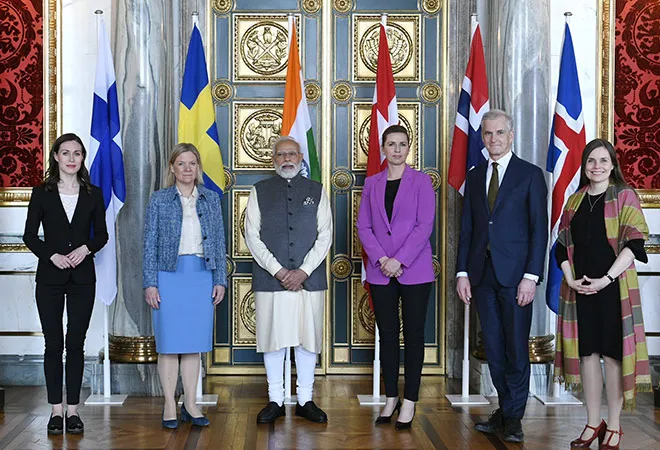The joint statement after the second India-Nordic summit in Copenhagen on Wednesday contains a strong condemnation by the Nordic Prime Ministers of the “unlawful and unprovoked aggression” by Russia in Ukraine. India is not party to the phrase, but its inclusion in the joint statement and the tenor of the statement itself in relation to Ukraine serve to underscore India’s increasingly shaky position on the issue.
The Indians have joined the Nordics in expressing “serious concern” over the ongoing humanitarian crisis in Ukraine and “unequivocally condemned civilian deaths” there and reiterated their well-known Indian position that there be “an immediate cessation of hostilities”.
Otherwise, the summit dealt with issues of deepening cooperation between the Nordic countries – Finland, Iceland, Denmark, Sweden and Norway. It pledged to press ahead with multilateral cooperation, green transition and climate change, the blue economy, innovation and digitisation.
The second leg of Prime Minister Narendra Modi’s visit took him to Copenhagen, where he participated in the second India-Nordic summit and had bilateral meetings with all the attending Prime Ministers.
India Offers a Large Market
With Denmark’s Prime Minister Mette Frederiksen, Modi reviewed India’s unique “Green Partnership”. Ukraine was an important issue in the political discussions and the India-Denmark joint communique issued on Tuesday made that clear by Denmark’s “strong condemnation of the unlawful and unprovoked aggression against Ukraine by Russian forces”.
The first Indo-Nordic summit was held in April 2018 and represented a new and major thrust area for India, which is the only other country with whom the Nordic countries interact in this manner, besides the United States.
The rich Nordic countries are an area of opportunity for India, especially now when they are estranged from Russia. The Ukraine war has, if anything, strengthened the impetus for bringing India closer to this region.
Indeed, two of these nations, Sweden and Finland, are contemplating joining the NATO along with the existing members of the outfit, Norway and Denmark. But there should be little doubt that they are not likely to find India’s pro-Russian neutrality particularly comfortable.
India offers a large market for these countries, while they are global technology leaders in many fields such as innovation, digital transformation, clean energy, healthcare and education. Their rich pension and sovereign wealth funds can be an important source of investment in India.
In a pre-visit briefing, foreign secretary VM Kwatra said that relations between India and the Nordic countries are shaped around four or five clusters – green partnership, digital and innovation economy, trade and investment links, sustainable development and partnership connected to the Arctic region.
The Turnaround in India-Denmark Relations
The big story here is the turnaround in India-Denmark relations. The two countries enjoyed excellent relations in recent decades. But issues related to the Purulia arms drop case led to a downgrading of Indian ties with Denmark in July 2012.
The Denmark government had refused to appeal against a lower court’s decision to reject a demand for the extradition of the main accused, Kim Davy (aka Niels Holck).
Normal ties were restored only by the end of 2016, and bilateral relations took off from the meeting of Prime Minister Lars Lokke Rasmussen and Modi during the first Nordic summit in Stockholm in 2018. Indeed, in 2019, Denmark became the partner country in the Vibrant Gujarat Global Summit in Gandhinagar, which was attended by Prime Ministers Modi and Rasmussen.
In September 2020, the new Prime Minister of Denmark, Mette Frederiksen, and Modi held a virtual summit focusing on healthcare in the backdrop of COVID and the need to diversify supply chains. At this summit, the two sides signed up to a Green Strategic Partnership focusing on trade, commerce and energy and Denmark agreed to join the International Solar Alliance mooted by India.
Beyond MoUs, Joint Statements, Summits
Last year, Prime Minister Frederiksen paid a state visit to India in October, the first visit by any head of government since the COVID lockdowns.
The upturn in relations between the two countries has been matched by a sharp increase in their trade between 2016 and 2021, which has grown 78 per cent from $2.8 billion to $5 billion.
While the Green Strategic Partnership anchors the bilateral ties between the two countries, they are also seeking to expand ongoing cooperation in the field of wind energy, water management, circular economy, shipping and smart cities.
With the Russian estrangement, which in some ways is also linked to a degree of caution towards China, the Nordic countries look at India as a potential partner. However, red tape, angular trade and industrial policies make New Delhi a difficult proposition. It is one thing to hold forth in summits, work up joint statements and MoUs, and quite another to change things on the ground.
This commentary originally appeared in The Quint.
The views expressed above belong to the author(s). ORF research and analyses now available on Telegram! Click here to access our curated content — blogs, longforms and interviews.




 PREV
PREV


